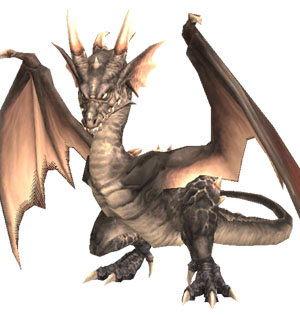The Wyvern is really a variant of the dragon, and one may suspect that it is really the creation of a herald's fevered imagination, rather than the expression of any ancient myth. Be that as it may, Wyverns are to be found gaping menacingly among the carved ornaments of many mediaeval buildings, writhing themselves around the titlepages of early printed books, and flying furiously towards nowhere in particular on the corners of the first, somewhat speculative, maps.
The Wyvern has the head of a dragon, and its forked tongue, scaly neck and leathery wings, but combines with these the two clawed feet of an eagle (whereas the dragon has four), and a long, serpentine tail which is often depicted as knotted, or twined upon itself, to indicate the extreme venomousness and violent temper of the monster.
In fact the tales of both these dreadful creatures were objects of particular horror. They were thought to pollute the earth over which they trailed, so that the grass was marked and fungus grew (hence 'fairy rings'), and left loathsome slime (such as frogspawn) or distorted creatures (such as flounders) in their wake.
The Wyvern shares the Dragon's passion for treasure, and its capacity for vigilance. Like the Dragon, also, the Wyvern is said to be preternaturally hot - hence, according to a seventeenth-century authority on heraldry, who in turn took his cue from the Prophet Jeremiah (xiv, 6) the fact that Wyverns and Dragons are always shown with their mouths wide open, as if gulping the cooling air.





 Edited by TheCakeIsALie65
Edited by TheCakeIsALie65